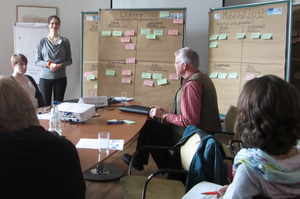
CSCP Workshop: Rio+40 - CSCP and participants from the Eine-Welt-Conference developed visions and actions for sustainable lifestyles in 2032
On 17 & 18, March 2012 CSCP held a workshop in Villigst, Germany, in which participants were encouraged to look ahead and imagine the year 2032. This workshop was organized in the framework of the conference "Rio+20 – How sustainable is the Green Economy ?" Questions such as ‘how does the YOU family live in the year 2050’, ‘how do we imagine our own lives in 2032’ as well as ‘which actions have to be taken now in politics, the economy, civil society and by ourselves’ were tackled.
In this interactive and creative workshop, participants had the opportunity to develop their personal visions for a sustainable lifestyle in 2032, the year in which Rio+40 would be approaching. In working groups, the participants discussed what life in 2032 could be like in the areas of consumption, mobility, society, living and communication, in order to accomplish a significant reduction of our current ecological footprint. In engaging and inspiring discussions, participants collaboratively developed plans and possible measures to be acknowledged and incorporated into political structure, the economy, civil society as well as individuals. Policy recommendations developed during the session raised awareness of how to tackle challenges of sustainable lifestyles and provided concrete ideas for how to reduce personal ecological footprints.
The „Rio + 20 - How sustainable is the Green Economy?“ conference was organised by the Eine-Welt-Netzwerk NRW, the Evangelische Academie Villigst / Institute for Church and Society, the Amt für Mission, Ökumene und Weltverantwortung (MÖWe), NABU NRW, the Bund NRW, the Youth Network Open Globe, the LAG 21 NRW and the CSCP (UNEP / Wuppertal Institute Collaborating Centre on Sustainable Consumption and Production).
The family YOU is a fictional family, developed by the CSCP in collaboration with Collective Invention. Its members, different in age, habits and beliefs embody various lifestyles that could belong to people in 2050. Their different attitudes towards sustainable consumption are used in visioning sessions in order to inspire participants about possible alternatives for the future and make them reflect on our current lifestyles.
Back to: News
